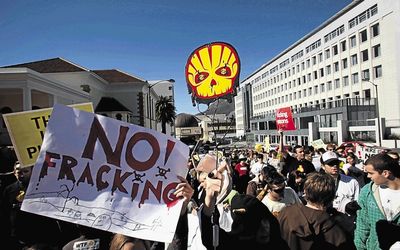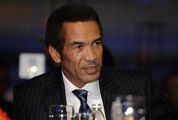SINCE the Lima negotiations last year, when countries were asked to communicate their intended nationally determined contributions ahead of the COP21 meeting in Paris later this year, 29 countries have submitted theirs to the United Nations (UN) Framework Convention on Climate Change.
The Department of Environmental Affairs has prepared SA’s proposed contributions and it is undergoing a stakeholder consultation process before the document is sent to the Cabinet for approval. Several civil society organisations and groupings are preparing responses.
SA’s contributions document is framed by the National Development Plan and the National Climate Change Response, and states an intention to develop a national climate-change adaptation strategy.
The unwillingness of some developed countries to commit to mitigation targets unless less developed countries also do so led to a stalemate in previous negotiations. This was broken at COP17 in Durban in 2011 when the Durban Platform for Enhanced Action was established.
The platform commits parties to negotiating a new global agreement that includes all countries and covers mitigation, adaptation, finance, technology transfer, capacity building and transparency, with a deadline of COP21, which is scheduled for December in Paris.
Uncertainty about the legal form of the new agreement, as well as reluctance from many countries to make binding commitments, resulted in agreement that all countries would submit contributions. Countries were asked to communicate their contribution documents to the UN framework convention in advance of COP21.
Under adaptation, SA lists six goals in its contributions document that include developing a national adaptation plan, building institutional capacity, and developing a vulnerability assessment and adaptation needs framework.
...
THE document outlines the country’s investment in adaptation to date, and the investment it requires from 2021 to 2030. From 2010 to this year, investment in national adaptation has increased from $640m to $2.31bn. The intention is to scale up a number of programmes beyond 2020 as part of the country’s adaptation efforts, including Working for Water, Working on Fire, Working on Wetlands, LandCare and Water Conservation and Water Demand Management.
Under mitigation, SA’s contributions document refers to the peak, plateau and decline emissions trajectory committed to in its national policy, with emissions contained within a range of 398 tonnes to 613 tonnes of CO²-equivalent by 2025 and 2030.
The contributions document shows the country’s investments in mitigation to include 79 independent renewable energy projects with more than 5,000MW capacity — with a contribution from private investment of R168bn. Public transport infrastructure received a R5bn boost in 2012, and investments have also been made in green economy initiatives.
SA states that its "aspirational" long-term goal is to bring total emissions to within the range of 212-428 tonnes CO²-equivalent by 2050, reserving the right to adjust this goal depending on factors such as other countries’ actions, socioeconomic implications, technologies, and outcomes of the new climate agreement.
It also claims that, according to a carbon budget produced by South African experts, its mitigation contribution is greater than its fair share, as determined by using principles of responsibility, capability and sustainable development. However, it acknowledges that other researchers have produced different results, and expresses willingness to engage further on ambition and fairness, "if others do so as well".
The contributions document is "premised on the finalisation of an ambitious, fair, effective and binding multilateral agreement" in Paris, "to enable the delivery of ambitious mitigation, adaptation, climate finance, technology, capacity building and effective transparency arrangements".
SA requires support for adaptation and mitigation in the form of finance, technology and capacity-building.
A civil society caucus, facilitated by Project 90 by 2030, has developed a set of benchmarks against which the quality, appropriateness and adequacy of the contributions document will be assessed.
...
THE caucus requests that SA clarifies the link between its contributions document and the new climate agreement — as yet, there is no agreement on whether the new agreement or the contributions that countries commit to will be legally binding.
Contributors to the civil society submission include the South African Climate Action Network, World Wide Fund, Adaptation Network Secretariat, and Alternative Information and Development Centre. Under adaptation, the submission calls for adaptation programming to support mainstreaming of climate change concerns into all aspects of development; to enhance existing development programming as a way of reducing vulnerability to climate change; to support investments in long-term local and national planning; to be supported by viable costing and resourcing; and to be oriented towards building local knowledge and capacity in adaptation.
It also requests that adaptation should not be premised on short-term project-based efforts and employment, and that it should favour labour-intensive initiatives over economic efficiency.
The caucus rejects genetically modified organisms, extended commercial agriculture, desalination and large dams as adaptation solutions. It calls for increased transparency in the disbursement of adaptation funds.
...
THE caucus calls on SA to provide a clear signal of commitment to containing global warming to 1.5°C — consistent with a fair share of the science global emissions trajectory; present a clear carbon budget with a mitigation target linked to a specific base year rather than an uncertain business-as-usual trajectory; and outline its potential financial trajectory to support greater efforts towards a low-carbon economy.
Fracking, carbon capture and storage, and nuclear power are rejected as mitigation options. The caucus also calls for SA to express its intention to participate in a global reform of fossil fuel subsidies.
A number of submissions from other civil society organisations are also being prepared, and the stakeholder engagement meetings are open to all interested parties.
The full documents should be read for a comprehensive understanding of the positions they present.
• Dada is a member of the Adaptation Network Secretariat

Antifracking protesters in Cape Town in 2011. A civil society caucus in SA rejects fracking, carbon capture and storage, and nuclear power as climate-change mitigation options. Picture: THE TIMES
SINCE the Lima negotiations last year, when countries were asked to communicate their intended nationally determined contributions ahead of the COP21 meeting in Paris later this year, 29 countries have submitted theirs to the United Nations (UN) Framework Convention on Climate Change.
The Department of Environmental Affairs has prepared SA’s proposed contributions and it is undergoing a stakeholder consultation process before the document is sent to the Cabinet for approval. Several civil society organisations and groupings are preparing responses.
SA’s contributions document is framed by the National Development Plan and the National Climate Change Response, and states an intention to develop a national climate-change adaptation strategy.
The unwillingness of some developed countries to commit to mitigation targets unless less developed countries also do so led to a stalemate in previous negotiations. This was broken at COP17 in Durban in 2011 when the Durban Platform for Enhanced Action was established.
The platform commits parties to negotiating a new global agreement that includes all countries and covers mitigation, adaptation, finance, technology transfer, capacity building and transparency, with a deadline of COP21, which is scheduled for December in Paris.
Uncertainty about the legal form of the new agreement, as well as reluctance from many countries to make binding commitments, resulted in agreement that all countries would submit contributions. Countries were asked to communicate their contribution documents to the UN framework convention in advance of COP21.
Under adaptation, SA lists six goals in its contributions document that include developing a national adaptation plan, building institutional capacity, and developing a vulnerability assessment and adaptation needs framework.
...
THE document outlines the country’s investment in adaptation to date, and the investment it requires from 2021 to 2030. From 2010 to this year, investment in national adaptation has increased from $640m to $2.31bn. The intention is to scale up a number of programmes beyond 2020 as part of the country’s adaptation efforts, including Working for Water, Working on Fire, Working on Wetlands, LandCare and Water Conservation and Water Demand Management.
Under mitigation, SA’s contributions document refers to the peak, plateau and decline emissions trajectory committed to in its national policy, with emissions contained within a range of 398 tonnes to 613 tonnes of CO²-equivalent by 2025 and 2030.
The contributions document shows the country’s investments in mitigation to include 79 independent renewable energy projects with more than 5,000MW capacity — with a contribution from private investment of R168bn. Public transport infrastructure received a R5bn boost in 2012, and investments have also been made in green economy initiatives.
SA states that its "aspirational" long-term goal is to bring total emissions to within the range of 212-428 tonnes CO²-equivalent by 2050, reserving the right to adjust this goal depending on factors such as other countries’ actions, socioeconomic implications, technologies, and outcomes of the new climate agreement.
It also claims that, according to a carbon budget produced by South African experts, its mitigation contribution is greater than its fair share, as determined by using principles of responsibility, capability and sustainable development. However, it acknowledges that other researchers have produced different results, and expresses willingness to engage further on ambition and fairness, "if others do so as well".
The contributions document is "premised on the finalisation of an ambitious, fair, effective and binding multilateral agreement" in Paris, "to enable the delivery of ambitious mitigation, adaptation, climate finance, technology, capacity building and effective transparency arrangements".
SA requires support for adaptation and mitigation in the form of finance, technology and capacity-building.
A civil society caucus, facilitated by Project 90 by 2030, has developed a set of benchmarks against which the quality, appropriateness and adequacy of the contributions document will be assessed.
...
THE caucus requests that SA clarifies the link between its contributions document and the new climate agreement — as yet, there is no agreement on whether the new agreement or the contributions that countries commit to will be legally binding.
Contributors to the civil society submission include the South African Climate Action Network, World Wide Fund, Adaptation Network Secretariat, and Alternative Information and Development Centre. Under adaptation, the submission calls for adaptation programming to support mainstreaming of climate change concerns into all aspects of development; to enhance existing development programming as a way of reducing vulnerability to climate change; to support investments in long-term local and national planning; to be supported by viable costing and resourcing; and to be oriented towards building local knowledge and capacity in adaptation.
It also requests that adaptation should not be premised on short-term project-based efforts and employment, and that it should favour labour-intensive initiatives over economic efficiency.
The caucus rejects genetically modified organisms, extended commercial agriculture, desalination and large dams as adaptation solutions. It calls for increased transparency in the disbursement of adaptation funds.
...
THE caucus calls on SA to provide a clear signal of commitment to containing global warming to 1.5°C — consistent with a fair share of the science global emissions trajectory; present a clear carbon budget with a mitigation target linked to a specific base year rather than an uncertain business-as-usual trajectory; and outline its potential financial trajectory to support greater efforts towards a low-carbon economy.
Fracking, carbon capture and storage, and nuclear power are rejected as mitigation options. The caucus also calls for SA to express its intention to participate in a global reform of fossil fuel subsidies.
A number of submissions from other civil society organisations are also being prepared, and the stakeholder engagement meetings are open to all interested parties.
The full documents should be read for a comprehensive understanding of the positions they present.
• Dada is a member of the Adaptation Network Secretariat



























Change: -2.60%
Change: -2.88%
Change: -2.44%
Change: -2.44%
Change: -5.26%
Data supplied by Profile Data
Change: 0.00%
Change: 0.00%
Change: -2.60%
Change: 0.00%
Change: 0.00%
Data supplied by Profile Data
Change: 1.98%
Change: -0.06%
Change: -0.19%
Change: -0.09%
Change: 0.57%
Data supplied by Profile Data
Change: 0.00%
Change: 0.00%
Change: 0.00%
Change: 0.00%
Change: 0.00%
Data supplied by Profile Data